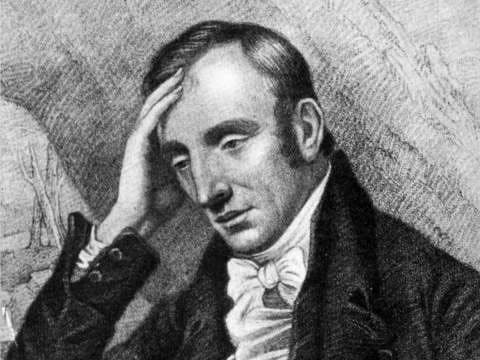William Wordsworth was born on 7th April 1770, in Cockermouth, Cumberland, England. He was a major English Romantic poet who along with Samuel Taylor Coleridge helped in establishing the Romantic Age/Era in English Literature with their joint publication ‘Lyrical Ballads’ in the year 1798. His parents passed away when he was quite young. He was raised amidst the mountains of Cumberland alongside the river Derwent.
The Fountain Poem by William Wordsworth presents the Romantic Imagination in the purest sense. Not only does it depict the power of imagination through simple diction and a realistic setting but at the same time promotes the romantic notion of turning to nature to enlighten one’s imagination. The conversation between the narrator in his youth and his seventy-two-year-old friend, Mathew, a man of experience, reflects the unfortunate changes that inevitably accompany the experience. However, the poem displays how Mathew’s experience does not degrade his imagination but rather empowers it. It is vital for the reader to include as one promoting the power of imagination to overcome worldly pains amidst a realistic and relatable setting.
The Fountain Poem Summary
The Fountain explained only the refined understanding of the imagination that emerges from experience but also increased the necessity of turning to overcome pain and loss as we age. This poem most effectively relays the imagination’s capabilities by presenting it in a realistic context. Rather than displaying it in a utopian setting through grandiose poetic devices. ‘The Fountain’ presents the imagination through a natural environment and simple diction to enforce its applicability to real life. Instead of evading worldly struggles, the poem embodies hardships to convey the imagination’s power to bring joy in times of sorrow. In addition to the context of the poem, the poet’s word choice is crucial to the poem’s realistic and relatable qualities.
The poem’s deflection of fanciful literary devices presents the notion of the romantic imagination in a less fanciful light as well. Wordsworth’s portrayal of such a miraculous power within a realistic setting sets the stage for how the romantic imagination is not only applicable in real life situations but crucial to impart joy in harder times that inevitably comes with age. Although sorrow and loss are evident products of Mathew’s experience, He overcomes them by turning to his imagination and finding joy through comforting memories. While Mathew understands the powers and the limits of his imagination, the young boy’s understanding of his imagination capabilities is entirely naive. His innocent state leads him to believe that his imagination can alter both past and present states. When Mathew tells him that his whole family has died, the boy foolishly believes that he can replace Mathew’s loved ones when he states “Mathew, for thy children dead/ I’ll be a son to thee”. Mathew has a refined understanding of the power of imagination knows that the boy’s proposal “cannot be” and yet turns to his memories of” the household hearts that were (once) his own” to bring him joy in the present state.
With experience, Mathew has not only lived through sorrow that the boy has not yet encountered, but has also experienced far more joys from which he can draw to overcome his loss. Despite the fact that his “Kindred (are) laid in earth” he declares that he is a “man of mirth” owing to his fond memories from the past. Because Mathew is aware of the world’s pains, it is even more necessary for him to turn to his imagination to find strength and joy in his present state. Mathew’s experience leads him to understand the importance of turning to nature to inspire his imagination and he testifies its importance to the boy through his interactions with natural surroundings. When the boy eagerly requests Mathew to match the “water’s pleasant tune” through “song or catch” or “church clock,” Mathew simply closes his eyes and matches its tune with memories and further reflections on nature. Mathew describes how he feels “vigour” as he sits by the same water that he heard as a boy that flowed through his years of innocence and into his years of experience and expresses how the fountain causes his eyes “dim with childish tears” and his heart to idly stir.
The past feelings from which Mathew draws to ignite his imagination reflect those of the boy who “lives and sing idle songs/Upon happy plains” in his innocent state. Mathew presents the consistent power that the fountain holds to enlighten one’s imagination in trying times as he explains how it “will murmur on a thousand years/And flow as it now flows”. Because the fountain will continue to flow the boy’s years of experience, it will help him return to happier times as it now does for Mathew. Mathew’s testimony of the power of nature to evoke his imagination displays his understanding of the increased importance of turning to the imagination to find joy in his old age.
While the poem displays nature’s power to ignite the imagination by evoking past memories, it also displays the importance of embracing present joys of nature to empower the imagination. At Leonard’s rock, Mathew and the boy exemplify the purest understanding of the imagination as they sing “witty rhymes/About the crazy old church-clock/And the bewildered chimes.” While this scene presents how time and experience bring change, it promotes the notion that the changes that come with time are powerless against the romantic imagination.
Central Idea of The Poem The Fountain
This poem presets a divine yet realistic notion of romantic imagination. It helps to provide relief to the heart and soul of a person. Mathew’s hardships such as death of his family are relatable to all people of experience and display the increased importance of embracing one’s imagination as they leave their innocence behind. Rather than degrading the imagination that he had at his youth the challenges that Mathew faces refine his imagination as he must turn to it to fight off the pains of the world. Mathew’s testimony of the heightened importance of utilizing the imagination as one age is sure to provide the reader with the strength and joy necessary to overcome earthly trials. A poem with such outstanding attributes no doubt deserves a very special place in the reader’s heart.
Some online learning platforms provide certifications, while others are designed to simply grow your skills in your personal and professional life. Including Masterclass and Coursera, here are our recommendations for the best online learning platforms you can sign up for today.
The 7 Best Online Learning Platforms of 2022
- Best Overall: Coursera
- Best for Niche Topics: Udemy
- Best for Creative Fields: Skillshare
- Best for Celebrity Lessons: MasterClass
- Best for STEM: EdX
- Best for Career Building: Udacity
- Best for Data Learning: Pluralsight











